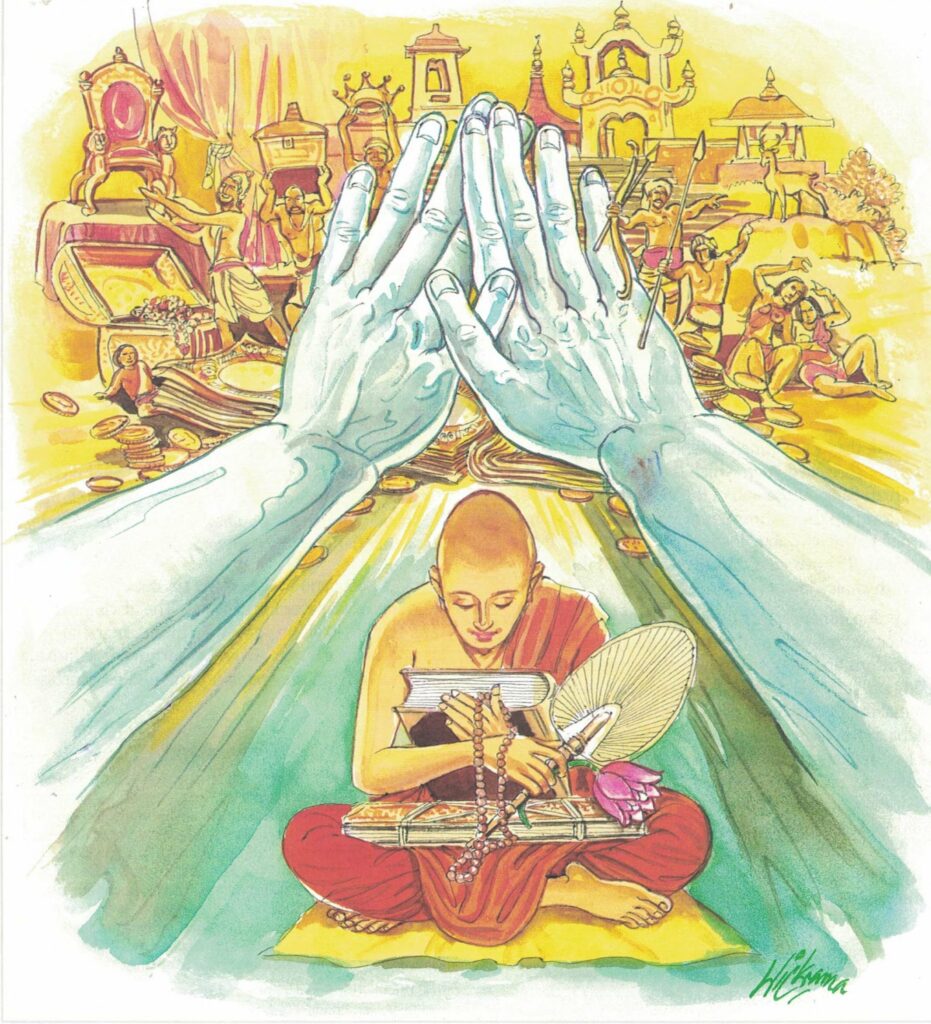Pali text, illustration and English translation of Dhammapada verse 84:
na attahetu na parassa hetu |
na puttamicche na dhanaṃ na raṭṭhaṃ |
na iccheyya adhammena samiddhimattano |
sa sīlavā paññavā dhammiko siyā || 84 ||
84. Neither for one’s own, nor for another’s sake one should wish for children, wealth, estate, nor success desire by means unjust, thus virtuous and wise, righteous one would be.

The Story of Venerable Dhammika
While residing at the Jetavana Monastery, the Buddha spoke this verse, with reference to Venerable Dhammika.
Dhammika lived in Sāvatthi with his wife. One day, he told his pregnant wife that he wished to become a monk; his wife pleaded with him to wait until after the birth of their child. When the child was born, he again requested his wife to let him go; again, she pleaded with him to wait until the child could walk. Then Dhammika thought to himself, “It will be useless for me to ask my wife for her approval to join the Sangha; I shall work for my own liberation.” Having made a firm decision, he left his house to become a monk. He took a meditation topic from the Buddha and practiced meditation ardently and diligently and soon became an arahat.
Some years later, he visited his house in order to teach the Dhamma to his son and his wife. His son entered the Sangha and he too attained arahatship. The wife then thought, “Now that both my husband and my son have left the house, I had better leave it, too.” With this thought she left the house and became a nun;eventually, she too attained arahatship.
At the congregation of the monks, the Buddha was told how Dhammika became a monk and attained arahatship, and how through him his son and his wife also attained arahatship. To them the Buddha said, “Monks, a wise man does not wish for wealth and prosperity by doing evil, whether it is for his own sake or for the sake of others. He only works for his own liberation from the round of rebirths (saṃsāra) by comprehending the teachings and living according to the dhamma.”
Explanatory Translation (Verse 84)
attahetu na parassa hetu na puttaṃ na dhanaṃ
na raṭṭhaṃ na icche adhammena attano samiddhiṃ
na iccheyya so sīlavā paññavā dhammiko siyā
attahetu: for the sake of one’s self, na: he does not; parassa hetu: for the sake of others; na: he does not; na puttaṃ [putta]: no son; na dhanaṃ [dhana]: no wealth; na raṭṭhaṃ [raṭṭha]: no kingdom; icche: does he wish; attano samiddhiṃ [samiddhi]: his own prosperity; adhammena: unrealistically; na iccheyya: he does not desire (to gain); so: such a one; selavā: well behaved; paññavā: penetrative; dhammiko [dhammika]: realistic; siyā: becomes
Not for one’s own benefit nor for that of others, does he desire children, wealth or kingdom. Nor does he desire self-glory. Thus he is realistic, penetrative and well behaved.
Commentary and exegetical material (Verse 84)
This verse gives an appropriate answer to the common question, “Why did Prince Siddhatta forsake his wife, child, parents and kingdom, if not for his own benefit.” This verse reminds us that he would not do the unrealistic thing for his own benefit or for another’s.
It is owing to the right understanding of the nature of the world, its instability, sorrowfulness and impersonality, that he left home. At the same time, he did not disparage worldly wisdom. He tried to acquire knowledge even from his servants. Never did he show any desire to display his knowledge. What he knew was always at the disposal of others, and that he imparted to them unreservedly. He tried his best to lead others from darkness to light. What he did was to stop running after illusions. He started to live realistically; not only for himself, but also to show an example to others.